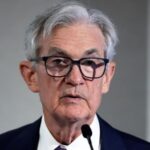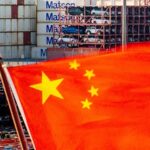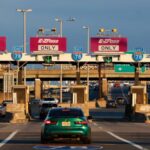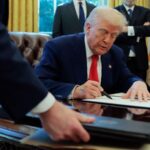New York
CNN
—
Just as soon as markets were up, they were down once again.
Cheap stocks and hope for signs of trade negotiation sent markets surging Tuesday morning — but that rally evaporated as the White House said it would levy enormous tariffs on China.
President Donald Trump is set to impose an additional 84% in levies across all Chinese imports on Wednesday, White House Press Secretary Karoline Leavitt announced Tuesday. That will mean all goods from the country are subject to a tariff of at least 104%.
US stocks, which soared Tuesday morning, were well below their session highs in the early afternoon. The Dow was up 375 points, or 1%. The broader S&P 500 gained 0.6%. The tech-heavy Nasdaq Composite rose 0.5%.
The S&P 500 and Nasdaq, which had surged as much as 4% and 4.5%, respectively, Tuesday morning, tumbled midday and briefly turned into the red as Leavitt spoke to reporters. The modest gains for the Dow come after the blue-chip index surged as much as 3.85% on Tuesday morning.
“We’re not anywhere out of the woods yet, and so that sort of tempers things,” said Thomas Martin, senior portfolio manager at Globalt Investments.
After markets plunged over the course of the past three trading sessions, Wall Street investors were looking for any excuse to catch their breath ahead of the planned tariff escalation at midnight — Trump’s hefty tariffs on China are a reminder that reprieve can be fleeting.
Over the course of the past few days, stock prices got absolutely hammered as Wall Street grew fearful that Trump’s tariff policy would plunge the US and global economies into a recession. But after three days of market carnage, investors appeared to be seeking some buying opportunities.
People walk by the New York Stock Exchange (NYSE) before the closing bell on April 2, 2025, just ahead of President Trump’s unveiling of his new tariffs on other countries.
Related article
What to do if the stock market’s big drop is getting to you
The price-to-earnings ratio of S&P 500 companies closed below 17 Monday — historically cheap, giving investors a chance to scoop up stocks they believe might be oversold.
“This is a very normal action and very technical in nature after a shock period,” said Truist’s Keith Lerner. “The market is extremely oversold, and markets don’t move in a linear fashion.”
Lerner noted that historic market rebounds tend to be clustered in with massive declines, as investors with FOMO worry they could miss out on a rally.
“In a period of uncertainty, each bit of new information is overextrapolated, which leads to wider-than-normal-swings,” Lerner added.
That explains why a bit of fake news Monday that Trump was considering a tariffs pause — immediately batted down by the White House — sent stocks temporarily surging. That gave markets a taste for what could happen if some nations begin to make progress in negotiating lower tariffs.
“Yesterday market players saw how the hint of ‘good news’ — in that case it was chatter about a pause in the Liberation Day tariffs — could rally markets by whole percentage points very quickly,” Michael Block of Third Seven Capital said in a note to investors. “Even though that proved to be all smoke, traders are now poised for the fire – that is, real news.”
Markets are coiled for a rebound
Investors are on edge for any updates from the White House that might signal Trump is negotiating his trade policy.
White House National Economic Council Director Kevin Hassett said Tuesday on Fox News that the administration is managing “a massive number of requests for negotiations” from nations and that Trump is prioritizing “two of our closest allies and trading partners,” Japan and South Korea.
Earlier on Tuesday, Trump posted on social media that he had “a great call with the Acting President of South Korea.” On Monday, Trump spoke with Japan’s Prime Minister Shigeru Ishiba, who will be sending a team to visit Washington to negotiate a trade deal.
Wall Street’s fear gauge, the VIX index, sank 13% after spiking to historic levels the past two sessions, reflecting easing jitters among traders. “Extreme fear” was still the sentiment driving markets, according to CNN’s Fear and Greed index, though the indicator showed mood had slightly improved since Monday.
“(Traders) are peeking around every corner looking for even the slightest whiff of a trade deal or movement on the tariff front,” said Jamie Cox, managing director at Harris Financial group. “The market is wound up for a face-ripping rally.”
Across the Atlantic, The European Union’s executive arm said the bloc is prepared to negotiate with the United States over buying more of its liquefied natural gas. It’s a response to a grievance raised Trump, who has said the EU must buy around $350 billion worth of American LNG to compensate for the deficit the US has in goods trade with the bloc.
Related article
US trade official defends Trump’s tariffs, says almost 50 countries approached him to ‘explore how to achieve reciprocity’
US Trade Representative Jamieson Greer said Tuesday during a routine hearing before the Senate Finance Committee that the administration is in talks with about 50 countries and that they’re trying to address some non-tariff related measures, such as foreign countries’ regulations that impede US exports.
Greer reaffirmed that Trump’s massive reciprocal tariffs will go into effect Wednesday.
“We will have the president’s plan go into effect, and we’re coupling that with immediate negotiations with our partners,” he said.
High-stakes game of chicken
While markets were trying to rebound Tuesday, there’s no guarantee stocks will remain buoyant.
After imposing across-the-board 10% tariffs on virtually all products coming into the United States Saturday, the Trump administration is set to impose significantly steeper levies still on dozens of countries. Those tariffs, which Trump has called “reciprocal,” although they are no such thing, amount to as much as 50% for a handful of countries.
Trump also threatened to slap an extra 50% tariff on China if the country doesn’t back down from its retaliatory tariffs it announced Friday. China’s Commerce Ministry on Tuesday said the country would “fight to the end” of the trade war and would continue to stand up to Trump.
The escalating trade war between the two largest economies is turning into a high-stakes game of chicken. China stared down a midnight deadline to avoid tariffs surging over 100%, but it so far is standing up to Trump, with no signs of blinking.
China has squashed deals that Trump wants — including a US company taking control of ports on both sides of the Panama Canal and a deal to sell TikTok to a US-based company. Both countries’ economies would be hurt in a trade war — and given the massive trade imbalance with the United States, China could very well be hurt worse.
So investors hopeful for a deal may not get one. And if they don’t, a damaging trade war could bring down both economies — and markets along with them.
Recession fears
Any escalation of the trade war would probably lead to a US and global recession this year, multiple Wall Street banks have said over the course of the past week, including Goldman Sachs and JPMorgan Chase. That could continue to sap demand for stocks.
Although the current bounce back may be short-lived, some in the Trump administration were already declaring victory.
“It’s finding the bottom now. It’s finding the bottom now,” Trump’s top trade adviser Peter Navarro said about the market Monday evening on Fox News. “It’s going to shift over and it’s going to be companies in the S&P 500 who are the first to produce here. Those are the ones going to lead to recovery. And it’s going to happen. Dow 50,000. I guarantee that and I guarantee no recession.”
Navarro’s optimism wasn’t matched by JPMorgan Chase CEO Jamie Dimon, who warned in his annual letter to shareholders Monday that Trump’s tariffs would raise prices, slow the global economy and weaken America’s standing in the world by tearing up its alliances. Even some of Trump’s allies, including Elon Musk and Bill Ackman, have recently warned that tariffs are bad policy that rely on extremely flawed logic.
Nevertheless, stock markets around the world rose Tuesday.
Most Asian stock indexes closed higher. Japan’s benchmark Nikkei 225, which tracks more than 200 of the country’s biggest listed companies, closed 6% up. In South Korea, the Kospi closed 0.3% higher. Australia’s benchmark ASX 200 closed 2.3% stronger. Hong Kong’s benchmark Hang Seng Index, composed of Hong Kong and mainland China’s largest listed companies, finished about 1.5% higher Tuesday. A day earlier, it had closed more than 13% lower on the day, in the biggest daily decline for the index since the 1997 Asian financial crisis.
In Europe, the benchmark STOXX 600 index was up 2.72%. France’s CAC index rose 2.5% and Germany’s DAX 2.48%, while London’s FTSE 100 index was up 2.71%.
CNN’s Phil Mattingly, Bryan Mena, Elisabeth Buchwald, James Frater, Anna Cooban and Juliana Liu contributed to this report.
















